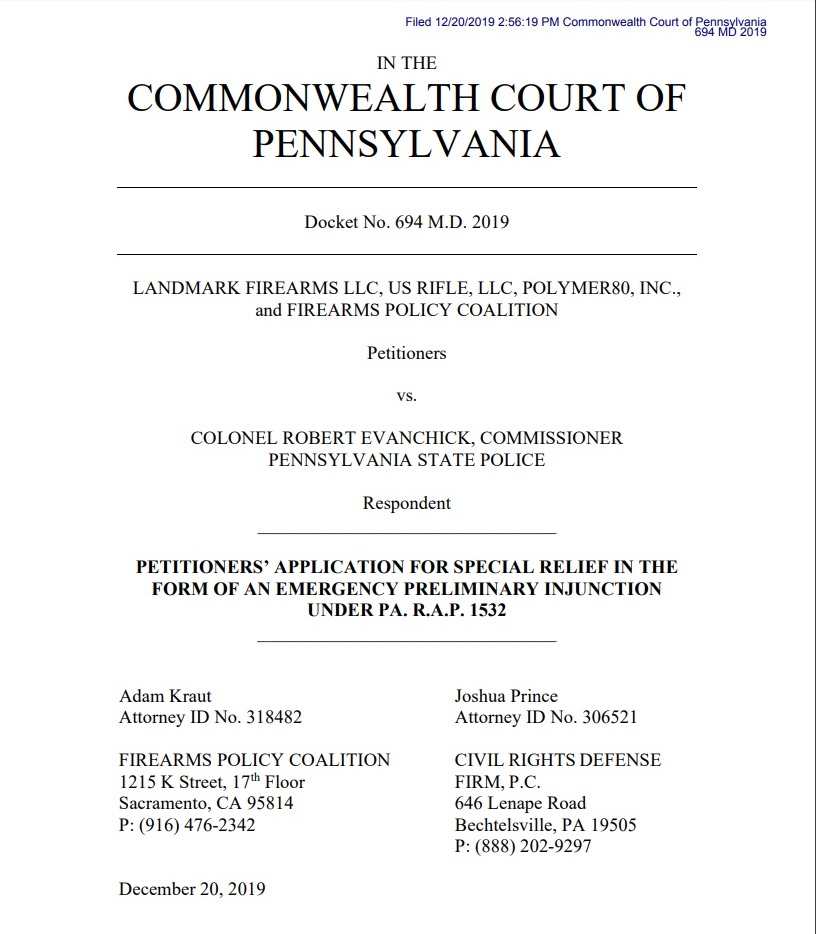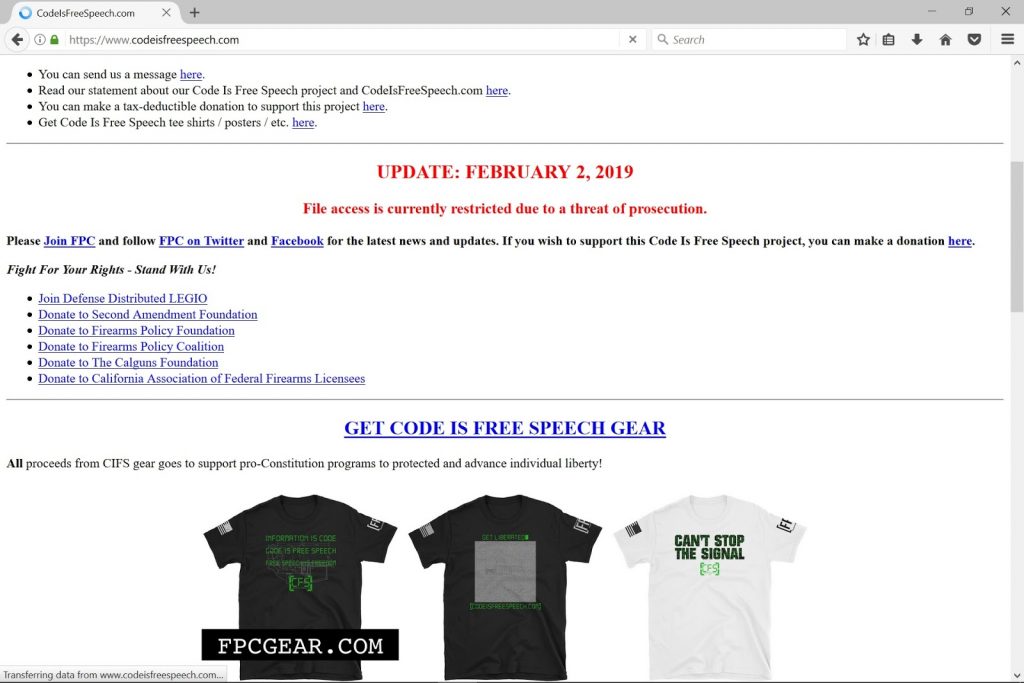Attorneys Joshua Prince and Adam Kraut have filed suit today in US District Court for the District of Columbia today on behalf of Damien Guedes, the Firearms Policy Coalition, the Firearms Policy Foundation, and the Madison Foundation. The lawsuit seeks an injunction as well as challenges the legal authority of Acting Attorney General Matthew Whitaker to issue such a rule when he has not been confirmed by the Senate.
From the plaintiffs release:
WASHINGTON, D.C. (December 18, 2018) — Today, attorneys for an owner of a “bump-stock” device and three constitutional rights advocacy organizations filed a federal lawsuit against the Trump Administration’s new confiscatory ban on firearm parts, additionally challenging Matthew Whitaker’s legal authority to serve as Acting Attorney General and issue rules without being nominated to the role and confirmed by the Senate or by operation of law. A copy of the court filings can be viewed at www.bumpstockcase.com.
The plaintiffs also filed a motion seeking a temporary injunction to prevent the Trump Administration from implementing and enforcing the new regulation. The lawsuit, captioned as Guedes, et al. v. BATFE, et al., is backed by Firearms Policy Coalition (FPC), Firearms Policy Foundation (FPF), and Madison Society Foundation (MSF), also institutional plaintiffs in the case.
“Bump-stocks” were legal under federal law and prior determinations of the Bureau of Alcohol, Tobacco, Firearms and Explosives until the agency issued a new final rulemaking today. Under the new rule, owners of the devices have just 90 days to surrender or destroy their property, after which they could face federal ‘machinegun’ charges that carry up to 10 years in prison and $250,000 in fines for each violation.
The plaintiffs are represented by attorneys Joshua Prince and Adam Kraut of Firearms Industry Consulting Group, a division of Civil Rights Defense Firm, P.C. Prince and Kraut previously filed a nearly 1,000-page formal opposition to the proposed regulation, which included a video exhibit showing the actual operation of a “bump-stock” device on an AR-15 type firearm. That opposition and its 35 exhibits can be viewed at www.bit.ly/fpc-bumpstock-reg-opposition.
“The ATF has misled the public about bump-stock devices,” Prince said. “Worse, they are actively attempting to make felons out of people who relied on their legal opinions to lawfully acquire and possess devices the government unilaterally, unconstitutionally, and improperly decided to reclassify as ‘machineguns’. We are optimistic that the court will act swiftly to protect the rights and property of Americans who own these devices, and once the matter has been fully briefed and considered by the court, that the regulation will be struck down permanently.”
In a January statement, Firearms Policy Coalition said that the federal “DOJ and BATFE clearly lack the statutory authority to re-define the targeted devices as ‘machineguns.’” Following that, in February, FPC also commented that as they “opposed the lawless manner in which President Obama often ruled by ‘pen-and-a-phone’ executive fiat,” they objected to and would fight “President Trump’s outrageous lawlessness here.”
“In its rulemaking, the Trump Administration is attempting to abuse the system, ignore the statutes passed by the Congress, and thumb its nose at the Constitution without regard to the liberty and property rights of Americans. That is unacceptable and dangerous,” explained Adam Kraut, an attorney for the plaintiffs. “It is beyond comprehension that the government would seek establish a precedent that it can arbitrarily redefine terms and subject thousands of people to serious criminal liability and the loss of property.”
Anyone who owns a “bump-stock” device and who would like to consider participating in the case should contact the FPC/FPF Legal Action Hotline at https://www.firearmspolicy.org/hotline or (855) 252-4510 (available 24/7/365) as soon as possible.
Count One of the lawsuit refers to Whitaker as “purported Acting Attorney General” and challenges his authority to issue the final rule. They refer to 28 U.S.C. § 508(a) which states that the Deputy Attorney General shall exercise the duties of the office of Attorney General in case of a vacancy. Given this, they argue that Whitaker cannot “lawfully perform the duties and
responsibilities of Attorney General, including the execution on December 18, 2018 and
implementation of the Final Rule.” I think even the Democrats might agree with this.
Count Two of the lawsuit alleges violations of the Adminstrative Procedures Act. Specifically, it accuses BATFE of a) failing to provide records as requested with regard to Proposed Rule; b) failure to provide a 90-day comment period as there were website issues; c) failed to consider cost impact and ignored any analysis on compensating bumpstock owners for a taking; d) failed to provide a hearing when requested; and e) issued a rule that is arbitrary and capricious which is a violation of the APA.
Count Three alleges that the final rule exceeds the legal authority of BATFE because it rewrites clear statutory terms to suit itself. Even Sen. Dianne Feinstein herself has said that BATFE lacks the clear legal authority to ban bumpstocks. Now, of course, she wants Congress to do it but that would be legal.
Count Four says the final rule violates the Internal Revenue Code. Since NFA items are taxed, this is why this comes into play.
26 U.S.C. § 7805(b) provides that “no temporary, proposed, or final regulation relating to
the internal revenue laws shall apply to any taxable period ending before … [¶ … ¶] [t]he
date on which any notice substantially describing the expected contents of any temporary,
proposed, or final regulation is issued to the public.”
Thus, any rule against any bump fire stock manufactured before March 29, 2018 could not be enforced on them.
Count Five goes to the fact that the Final Rule bans bump fire stocks and says no compensation need be given. This the suit alleges violates the Takings Clause of the Fifth Amendment.
Count Six alleges an Ex Post Facto violation as bump fire stocks were previously classified by the BATFE to be legal. Changing the law after the fact would seem to violate Article I, Section 9, Clause 3 of the U.S Constitution.
Count Seven alleges that the Final Rule violates the Contract Clause of Article 1 of the Constitution by destroying the value of investments that had been made consistent with previous BATFE rulings and classifications of bump fire stocks.
Count Eight is the final count. It accuses BATFE of violation of the Freedom of Information Act for failing to provide records that were properly requested by the Firearms Policy Foundation months ago.
The prayer for relief seeks both a preliminary and permanent injunction against the enforcement of the Final Rule, a declaration that Matthew Whitaker did not have the legal authority to issue the Final Rule which makes it null and void, and for declarations that the aforementioned violations are Constitutionally impermissible.
The full 37-page complaint is here.
UPDATE: The Guedes case had some changes today. First, the Firearms Policy Coalition dropped out of the lawsuit in order to file a separate lawsuit on procedural grounds. More on that lawsuit in a separate post but the intent is to have one lawsuit argued on the merits of the case – Guedes – and a second lawsuit challenging the Final Rule on the grounds it was issued by someone who didn’t have the authority to do so.
Second, in their amended complaint, the plaintiffs added Missouri St. Representative Shane Roden (R-Franklin County) and Florida Carry. Moreover, it dropped Count One (see above) which challenges the authority of the purported Acting Attorney General Matthew Whitaker to issue the rule. That will now be moved to a separate case involving only the Firearms Policy Coalition.
The goal in separating the issues is to have one case that will move quickly on procedural issues – FPC v. Whitaker – and a second case that move at the speed that it moves on the merits of the case. The challenge on procedural issues is an effort to stay the case in the short term.


